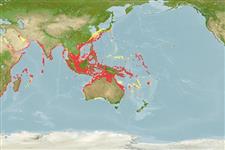Preferred temperature (Ref.
115969): 24.4 - 29.1, mean 28.1 (based on 2094 cells).
Phylogenetic diversity index (Ref.
82804): PD
50 = 0.5000 [Uniqueness, from 0.5 = low to 2.0 = high].
Bayesian length-weight: a=0.01175 (0.01029 - 0.01342), b=3.04 (3.01 - 3.07), in cm Total Length, based on LWR estimates for this species (Ref.
93245).
栄養段階 (Ref.
69278): 4.0 ±0.0 se; based on diet studies.
回復力 (Ref.
120179): 低い, 4.5年~14年の倍増期間の最小個体群 (K=0.17; tm=2-3; tmax=22; Fec=43,618).
Prior r = 0.28, 95% CL = 0.19 - 0.42, Based on 1 data-limited stock assessment.
Fishing Vulnerability (Ref.
59153): High vulnerability (58 of 100).
Climate Vulnerability (Ref.
125649): Very high vulnerability (76 of 100).
